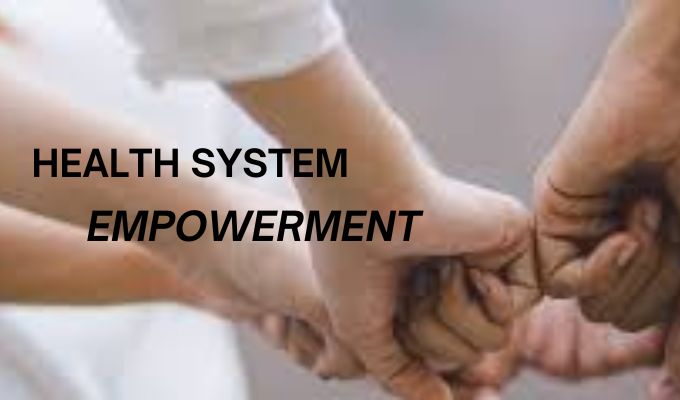In a world whereHealth System Empowerment remains a challenge for many, the role of donors is nothing short of heroic. Imagine a scenario where every community has a robust health system, ready to tackle any challenge it faces. This is the vision that drives donors to make a difference. Through their contributions, they’re not just giving money; they’re building stronger health systems from the ground up. From funding essential medical equipment to supporting healthcare infrastructure, donors are the unsung heroes behind the scenes, working tirelessly to ensure everyone has access to the care they deserve.

Introduction:
In the quest for healthier communities worldwide, the journey towards building stronger health systems is laden with challenges and opportunities. This guide delves into the pivotal role of donors in catalyzing this transformative change, from addressing infrastructure deficits to advocating for preventive healthcare measures. By investing in essential areas and fostering collaborative partnerships, donors play a crucial role in ensuring access to quality healthcare for all.
Unveiling the Challenges:
Before delving into the solutions, it’s essential to understand the hurdles hindering the development of robust health systems. These challenges range from inadequate infrastructure and shortages of healthcare professionals to limited access to essential medicines and preventive healthcare services.
Donors: Catalysts of Change:
Donors emerge as the driving force behind positive change in healthcare systems globally. Through their contributions, whether financial or in-kind, donors serve as catalysts, propelling initiatives that aim to strengthen health systems and improve healthcare delivery.
Investing in Infrastructure:
One cornerstone of building stronger health systems is investing in robust infrastructure. Donors play a vital role in funding the construction and renov

ation of healthcare facilities, ensuring that communities have access to quality care closer to home.
Empowering Healthcare Professionals:
Another critical aspect is empowering healthcare professionals. Donors support initiatives that enhance training programs, provide continuing education opportunities, and attract skilled professionals to underserved areas, thereby bolstering the healthcare workforce.
Promoting Preventive Healthcare:
Prevention is key to reducing the burden of disease and fostering healthier populations. Donors champion initiatives focused on promoting preventive healthcare measures such as vaccination campaigns, health education programs, and screenings for early detection of diseases.
Ensuring Access to Essential Medicines:
Access to essential medicines is a fundamental aspect of healthcare delivery. Donors contribute to initiatives aimed at improving pharmaceutical supply chains, reducing medication costs, and ensuring equitable distribution of medicines to those in need.
Collaborative Partnerships:
Effective collaboration between donors, governments, non-governmental organizations (NGOs), and local communities is essential for sustainable progress. Donors foster partnerships that leverage diverse expertise and resources, maximizing impact and reaching vulnerable populations.
Impact Assessment and Evaluation:
Regular assessment and evaluation are crucial to gauge the effectiveness of interventions and make data-driven decisions. Donors support rigorous monitoring and evaluation processes to ensure accountability and optimize outcomes.
Sustainable Funding Models:
Sustainability is key to long-term success in health system strengthening efforts. Donors work towards establishing sustainable funding models that reduce reliance on external aid and promote self-sufficiency within healthcare systems.
Public Awareness and Advocacy:
Raising public awareness and advocacy are integral to garnering support for health system strengthening initiatives. Donors engage in advocacy efforts to promote policy changes, mobilize resources, and foster a culture of health and well-being within communities.
The Road Ahead:
While progress has been made, challenges persist, and the journey towards building stronger health systems is ongoing. It requires continued commitment, innovation, and collaboration from donors, governments, and stakeholders at all levels.
Conclusion:
In conclusion, donors play a pivotal role in building stronger health systems that are resilient, equitable, and responsive to the needs of communities. By addressing challenges, investing strategically, and fostering partnerships, donors contribute to improving health outcomes and enhancing the well-being of populations worldwide. As we look to the future, sustained efforts and collective action will be essential in realizing the vision of accessible and quality healthcare for all.

FAQS:
Q1:How do you strengthen a system?
Strengthening a system involves several key steps, including enhancing infrastructure, improving governance and management practices, investing in human resources, fostering innovation, ensuring sustainability, and promoting collaboration and partnerships within and outside the system. By addressing these aspects comprehensively, a system can become more resilient, efficient, and capable of delivering better outcomes.
Q2:What is donor dependency?
Donor dependency refers to the situation where an organization, community, or country relies heavily on external donors for financial or other forms of support to sustain its operations or meet its needs. This reliance can create vulnerabilities and limit the recipient’s ability to exercise autonomy and make independent decisions.
Q3:What are the pillars of the health care system in Kenya?
The pillars of the healthcare system in Kenya include:
a. Primary Healthcare: Providing essential health services accessible to all individuals and communities.
b. Healthcare Financing: Ensuring sustainable funding mechanisms to support healthcare delivery and infrastructure.
c. Human Resources for Health: Developing and retaining a skilled workforce to deliver quality care.
d. Health Information Systems: Establishing robust data collection, analysis, and reporting mechanisms to inform decision-making and improve health outcomes.
e. Infrastructure and Medical Supplies: Building and maintaining healthcare facilities and ensuring the availability of essential medical equipment and supplies.
f. Governance and Leadership: Establishing effective governance structures and leadership frameworks to guide policy formulation, implementation, and monitoring.
Q4:Who are the health donors in Kenya?
In Kenya, health donors include a variety of international organizations, bilateral agencies, and non-governmental organizations (NGOs). Some prominent health donors operating in Kenya include the World Health Organization (WHO), the United States Agency for International Development (USAID), the United Nations Children’s Fund (UNICEF), the Global Fund to Fight AIDS, Tuberculosis and Malaria, the Bill & Melinda Gates Foundation, and various European Union (EU) member states through their development agencies. These donors contribute funds, technical expertise, and resources to support healthcare programs and initiatives aimed at improving health outcomes in Kenya.


